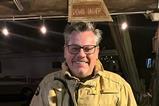Thousands of families will be going into this Christmas season with empty places around the dinner table. They will be mourning the loss of loved ones to Covid-19 and other illnesses. Cognitive behavioural therapist Louise Morse shares her own very painful experience of losing her son and grandson and explores some of the dos and don’ts when it comes to helping others navigate bereavement

Two years ago this month I was sitting with my daughter and her husband listening to a police family liaison officer explaining why we couldn’t go to the hospital and say goodbye to my 19-year-old grandson, Luke, who’d died two hours earlier on a deserted country road after skidding into a ditch on his motorbike and crashing head first into a telegraph pole. He had been killed instantly.
I could hear the officer clearly enough but seemed to be looking at him through a long telescope. How could he be talking like this about my Luke?
Luke was a quiet, gentle lad, working his gap year in a supermarket. He wasn’t interested in speeding, but just loved polishing his new motorbike and pootling around on it. Because he knew it made me anxious, he had taken a course in safe motorbike riding and even stuck bunny ears on his helmet to assure me he would be seen by car drivers.
Now he was in a hospital mortuary and a police officer was telling me and his parents that we couldn’t say goodbye. Luke’s injuries were so catastrophic that we couldn’t see him. He would be identified from his dental records.
But we so needed to be there with him. He was more than simply a part of our lives; he was part of our souls. We needed to touch him, to tell him we loved him and to say goodbye. That last goodbye is an important part of the beginning of closure in the grieving process, but we couldn’t do it.
For weeks afterwards I battled physical reactions including night terrors and bones that ached so much I looked for bruises. At times I would find myself frozen, staring into space, not remembering what I’d been doing the moment before.
But I also discovered God’s faithfulness. The scriptures are absolutely true: the eternal God is our refuge and underneath are the everlasting arms (Deuteronomy 33:27). I found the most healing element of grief is the people God puts around you. I also found that there are practical and spiritual steppingstones that can take us wisely through the grieving process.
Complicated grief
Tens of thousands of families are grieving this year, not because of motorbike accidents (although there will be far too many of those) but because of the coronavirus. The number of deaths has topped 60,000 as I write, and there are around 30,000 people who died because their treatment was stopped as hospitals prioritised Covid-19 patients.
Most families weren’t able to visit because of strict infection controls, and many haven’t been able to say a final goodbye. Their grief may be complicated with guilt and anger, horror and despair. Many are said to be suffering from traumatic stress disorder syndrome (PTSD).
As a cognitive behavioural therapist, I’m aware that we deal with grief in our own, unique ways. But for all of us it’s like finding our footing through a slippery bog, like Christian in the Slough of Despond in The Pilgrims Progress.
Over the past two years I’ve discovered what helps and what doesn’t. For example, telling someone recently bereaved that their loved one is now in a “better place” when everything in you screams that you want them here, now, is not the best response.
Yes, the grave has lost its victory and death its sting, and thank God for Jesus’ cross that gives us eternal life, but it’s not just that the person is somewhere else, it’s the wound in the soul that is still bleeding. It’s like losing a leg: you will recover but you will never be bi-ped again, as CS Lewis observed.
It also doesn’t help when someone says: “I’m sorry for your loss.” Many people have shared how they find that phrase impersonal and distancing. Fortunately, no-one said it to me: barely hanging on to myself let alone my social skills I would have retorted that I lose many things, like my glasses and keys, but I don’t lose my loved ones! But I understand that it’s difficult to know what to say when grief is so raw. For this reason many people will stay away.
I’m so grateful for those who supported me at the time. Most of them didn’t know what to say, but they came anyway; my neighbours, my family, my colleagues who called and texted, including my CEO (who is gifted with an unusually comforting voice) and my friends from all over. They helped draw me back from the ice floe in the parallel universe I felt was living in.
Held together in Christ
I wonder, too, if we fully realise the power of the Holy Spirit. Eight weeks before Luke’s death, my youngest son Hywel, living in South Carolina, lost his 12-year fight with leukaemia. It happened so fast in the end I couldn’t get a flight in time to be with him, so I telephoned and his wife put us on speakerphone.
Hywel was too weak to talk, so I told him how wonderful he is, then prayed. I asked the Holy Spirit to fill the room and to fill Hywel so that he would feel comforted and completely at peace. As I prayed with my eyes closed, I felt Hywel and Jana’s presence as closely as if I were in the room with them.
The Bible says that Jesus Christ holds all things together (Colossians 1:17) and in that holding together are possibilities far beyond the physical boundaries that limit us. After our “amen” Hywel simply said, “I love you mum,” and it was done, the “good night, see you in the morning” said. I knew it would be a long grief journey, but it had begun properly.

































